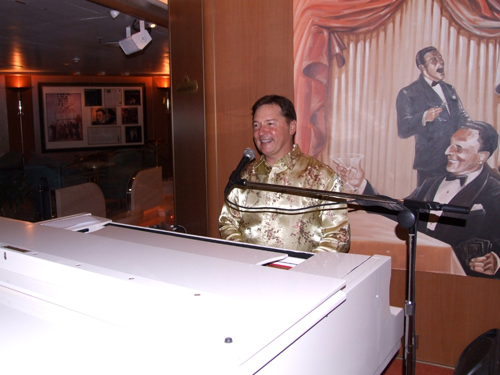
By Donald H. Harrison
ABOARD SEA PRINCESS – Across from the glass-enclosed elevators on Deck Seven, the third level of Sea Princess’s atrium, is a piano mounted on a platform. In front of the piano and curving around half the atrium are 120 seats. They start filling up about an hour before the 9 p.m. to midnight performance of Sammy Goldstein.
Goldstein plays the piano and sings well-known songs, but that is only part of his attraction to cruisers aboard the 2,000 passenger vessel. Goldstein also has a knack for learning people’s names, remembering tidbits about their lives, enjoying their jokes, and making them feel that his parlor is their home away from home. And they keep coming back to enjoy the comfortable surroundings.
Sitting behind his piano, up on a platform that is high enough for him to survey the crowd but low enough to create a sense of intimacy, Goldstein watches the people as they come in, and, good host that he is, quickly draws them in. He’ll ask their names, inquire where they are from, and to cement their particulars into his memory, may sing a song that such information inspires. One woman named “Darlene” was treated to a version of “Good Night Irene,” modified to “Goodnight Darlene.” A Manhattanite prompted a parody of “New York, New York.”
Each evening, Goldstein comes prepared to his piano with a full program of songs. He likes to do tributes to such composers as Irving Berlin, Cole Porter and George Gershwin, introducing this or that song with interesting facts about the composers’ lives, or some tidbit about the song’s history. He also likes to put the focus on certain singers, with one night’s program, for example, examining the songs of the “Rat Pack” – Frank Sinatra, Dean Martin and Sammy Davis Jr.
On other evenings he will pass out song sheets containing the lyrics of some 100 old songs – “Bicycle Built for Two,” “Take Me Out to the Ballgame” even “M-I-C-K-E-Y Mouse” and lead his audiences through jolly, rollicking renditions. If someone sitting close is off key, he ignores it – fun, not musical perfection, is what Goldstein hopes to prompt from his audience. Other evenings he will lead sessions of “Name That Tune” or “Who Knows the Lyrics?”
Although Goldstein carefully prepares such programs, he does not feel bound by them. He’d rather go with the flow, trading ad libs with his audience, enjoying a joke, celebrating a birthday, gently teasing passengers and being teased back.
On our cruise, there was one regular named “Jim” who’d happily raise his hand no matter what question Goldstein would ask. “Is there anyone here from Scotland?” the entertainer might inquire. Jim’s hand would go up. “I see,” said Goldstein. “And how about Wales?” Again Jim’s hand would go up. Eventually, Goldstein would work this into his patter. “So let’s see, besides Jim, how many of you are from India?”
The cruise drew its share of travelers from other countries, but leaving as it did from San Francisco on a 10-day round trip cruise to Alaska, its overwhelming
majority of passengers were from that City by the Bay. Of course, Goldstein sang about the heart he left in that city à la Tony Bennett, and worked “California Here I Come … Right Back Where I Started From” into his repertoire. During a rendition of “Take Me Out To the Ballgame,” as is traditional when someone reaches the lyric “root, root, root for the home team” most of the room substituted the name of their favorite team, “The Giants!” Nancy and I were but a small, lonely contingent who sang “the Padres.”
“Wait a minute,” said Goldstein, “I thought I heard another team mentioned besides the Giants. Where are the Padres from?”
“Last place!” boomed out one of the San Franciscans.
“Oh yeah?” said Nancy, taking up the challenge. “The Giants would be no where, if you didn’t have our former manager, Bruce Bochy, working for you now.”
There were grumbles around the room, but everyone was in too good a mood to really argue.
Celebrating birthdays is one of Goldstein’s specialties. Of course, he leads his audience in singing “Happy Birthday,” but as often as not, he’ll suddenly insert into the song a lyric about the poor old so-and-so who “ain’t what he used to be, ain’t what he used to be” just for fun.
Goldstein’s piano bar—officially called “Crooners” – is a place where nostalgia, good will, and high spirits reign. Sometimes Goldstein will sing a “naughty,” lyric, but he refrains from crossing the line into obscenity. Sometimes he rewrites a lyric with a political barb, but he’s careful to keep it all bipartisan.
Staff members of Sea Princess enjoy Goldstein’s easygoing ways, and like to play along with his jokes. On one occasion, Goldstein spotted Cruise Director Gavin Chandler passing by the piano bar and stopped him midway by giving him a rousing introduction. Chandler stopped, of course, to acknowledge the applause. Goldstein then suggested that the cruise director had visited because “he wants to buy a drink for everyone!” Chandler, smiling with apparent embarrassment, nodded his affirmation and marched over to a nearby bar, whispering something to bartender Adrian Evans.
As Goldstein sang more songs, Chandler and Evans conspired. Eventually, Chandler marched with the largest glass in Evans’ collection—almost punch bowl sized. In it were perhaps 40 straws. “That’s what you said,” he told Goldstein, “a drink for everyone.” One or two passengers did go up to Goldstein’s piano to take a sip, but for the most of the evening it sat on his bar—a tribute to a joke based on grammar.

I had the opportunity one afternoon to chat with Goldstein about his career. I learned that his father, Ernest, was in the shmata business, operating a women’s clothing store in Paris, Tennessee. It was from his dad that Goldstein learned a few Yiddish phrases such as schmooze, l’chaim and kvetch with which he seasons his patter. His mother, Jerri Wilkerson, was part Irish, French and Cherokee. When he and his brother and sister were children, their mother encouraged them to play the piano. But their piano teacher was so “old fashioned and boring,” they all soon quit.
Instead, Goldstein went out for drama, carrying his high school passion into college and community theatre productions. At the University of Alabama and later at Memphis State University he majored in voice, with a minor in theatre, and had he not wandered into a Holiday Inn in Memphis and heard Mary Jane Collins at the piano bar, he might today be trodding the boards instead of tickling the ivories.
Mary Jane Collins had worked at fabled Pat O’Brien’s Bar in New Orleans, famous for its back-to-back pianos and for enthusiastic Louisiana State University and Tulane University crowds. She later opened her own place in the French Quarter called “Mary Jane’s,” but eventually settled in Memphis where she worked the hotel bar circuit.
“I was mesmerized,” recalled Goldstein. “That lady became a wonderful mentor, and she would let me come in and record her, and then take the tapes into practice rooms and figure out what she was doing. She knew everybody’s name. She sang and played. She could play almost anything off the top of her head, and that is how I got my whole style of learning to play without looking at the keys, and instead looking at everyone.”
After Memphis State, Goldstein moved to Los Angeles, hoping to break into movies and theatre. “When I first arrived, I went everywhere looking for a desk clerk job or waiter job, and it was the hardest thing in the world to find one. Then someone suggested that I go to a piano bar, so I went in, and they let me audition, and they hired me.” He began to work Tuesday through Saturday evenings at a place called “Lillian’s” in West Hollywood.
There he polished the craft taught to him by Collins. “One thing Mary Jane taught me, it was kind of her mantra. ‘Always treat your venue like it is your living room and these are your friends and family.’ So I keep it personal, always put out bits of trivia about songs or shows I am doing, joking around with people.” Sometimes, if visitors are from France or Germany, he will sing a song or two in their languages.
From Lillian’s it was onto another bar, but at this point in his career, Goldstein’s focus was divided. He’d sing at night and audition the next morning, often with a throat raw from the cigarette smoke of the bar patrons. Although he snagged a few small parts and commercials, eventually, he realized that the two careers were incompatible. Either he could devote full time to seeking movie and stage parts, or he could continue to entertain in piano bars.
He said when he decided on piano bars, it was with the idea of eventually being hired to perform on a cruise ship – a thought that he said was inspired by watching the old “Love Boat” television series.
Although winning a job in the cruise ship industry was difficult –“each line told me it didn’t hire anyone who hadn’t already performed on a cruise ship” – his break came when a scheduled entertainer became sick and the cruise line needed a replacement. What initially was to be a two-week engagement stretched into months.
Now, Goldstein is a regular performer on Princess’s 16 ships, each year typically spending four months on one and three months on two of the others. The remaining two months of the year he uses to visit relatives in Tennessee and friends in New York City, where he maintains an apartment. He keeps his fans posted on his ship assignments via his website, www.sammygoldstein.com
There’s a difference between working a piano bar on a cruise ship and a piano bar on land, Goldstein asserts. Cruise ship passengers don’t have to drive home at night, so they can be more relaxed. Although waiters circulate through Crooners, Princess does not push people to consume alcohol, and so it’s
rare for the crowd to include obstreperous drunks. Furthermore, the crowd changes every 10 days or so, so there are always new people to meet and to entertain.
Sometimes, famous entertainers will frequent his piano bar night after night during a cruise. In the past, these included such celebrities as Tom Selleck, Rita Moreno, and Patricia Morrison, the latter the singer who played the title role in Cole Porter’s Broadway hit musical, Kiss Me Kate, in 1948.
Morrison was already 92 years of age when she came into hear Goldstein play, and, unable to contain himself, he asked if she would be willing to sing a song from the production while he played. She said she might hum along, but after a few bars, to the delight of the audience, the one-time mezzo-soprano belted out one of the songs from the musical.
“Thank goodness she did it in my key, because I can’t transpose by ear, and her voice was in perfect form!” enthused Goldstein.
*
Harrison is editor of San Diego Jewish World. He may be contacted at donald.harrison@sdjewishworld.com File: US Canada West 20